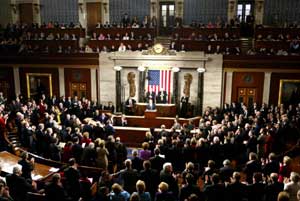| Home | Blog | Ask This | Showcase | Commentary | Comments | About Us | Contributors | Contact Us |

Imperial presidency, invisible CongressASK THIS | November 319, 2005The post-Watergate checks to presidential power have crumbled. Andrew Rudalevige, author of ‘The New Imperial Presidency,’ proposes that reporters ask members of Congress when and if they plan to reassert themselves. By Andrew Rudalevige Q. After the 9/11 attacks, and again in October 2002, Congress granted the president very broad authorizations to use force – in the first case, against opponents defined by the president himself. Should legislators revisit these “blank check” resolutions in the light of additional information about the executive decision-making process that led to the Q. The administration has opposed Senator John McCain’s amendment barring torture by American personnel in the war on terror. But it argued earlier that statutes limiting the president’s power as commander-in-chief were unconstitutional. Does the president still make this argument? What are its ramifications for enforcing the McCain amendment, should it become law? Q. In 2004, the Supreme Court found that the September 2001 authorization to use military force gave the president the power to detain enemy combatants, even those who were American citizens. Is that what Congress intended in passing that resolution? If not, why have legislative efforts to regulate the detention regime taken more than four years to get started? Q. Before the Iraq war, Congress was told that the cost to the Q. Since 2001, the administration has cut back on the information available to the Congress and the public through the Presidential Records Act, the Freedom of Information Act, and has cut general oversight through Congress’s auditing agency, the GAO. (See, e.g, E.O. 13233 amending the Presidential Records Act to allow current and former presidents the ability to delay or prevent the release of historical documents governed by its provisions.) Why has Congress not acted to restore the flow of information it needs to conduct stringent oversight? Q. This year, for the 15th year out of the last 17, the budget was not passed by the start of the fiscal year. Do the late, omnibus budget bills that result give the president too much power over the “power of the purse” the Constitution gives to Congress? After the Vietnam War and Watergate, Congress acted to reject presidential claims of unilateral executive authority and to assert its own power. The War Powers Resolution, the Intelligence Oversight Act, the Ethics in Government Act (and its independent counsel provisions), the Congressional Budget and Impoundment Control Acts, the Presidential Records Act, sweeping amendments to the Freedom of Information Act -- all these were part of the legislative resurgence of the 1970s. Over time, though, this statutory framework has crumbled. Presidents retained a solid base of authority grounded in their ability to set the public agenda, the commander-in-chief power, their veto leverage, and their authority to implement policy through appointments, executive orders, and centralized management. George W. Bush’s predecessors used those tools – and Congress’s consistent unwillingness to enforce the strictures it had enacted -- to rebuild the infrastructure of the “imperial presidency.” Bush, of course, has enthusiastically abetted that effort with aggressive claims about the ability of the president to act unilaterally and about the inability of others to check that behavior or even to gain information about it. Such efforts ranged from signing statements selectively executing the law, to the sealing of presidential records and deliberations, all the way (after the September 11th attacks) to the current debate over torture and the designation of American citizens as “enemy combatants” who could be removed from the justice system and tried (if at all) by military tribunals themselves created by executive order. In our system, strong presidential leadership is essential – but if unchecked and undebated it can also do damage to the soul of our self-governance. Our government is built on the presumption that (in James Madison’s phrase) “ambition [will] counteract ambition.” But so far Congress’s ambition has largely manifested itself in a desire to avoid the blame that can be associated with making difficult decisions. In the lead-up to the To be sure, it is not the legislative branch’s job to manage policy implementation on a day-to-day basis. But Congress has a critical task nonetheless. Its job is to use debate and deliberation to distill priorities and set clear standards; to oversee and judge the decisions and actions of others by those standards; to expose both the bad and good efforts of government to public scrutiny; and to revisit its earlier debates in the light of later events. Debate, judgment, and oversight are delegated to other actors in the system at our potential peril. The “imperial presidency” can only be empowered by an “invisible Congress.” It’s time for another Congressional resurgence.
|
||||||||||||




